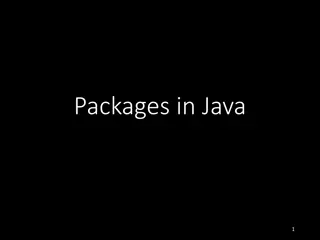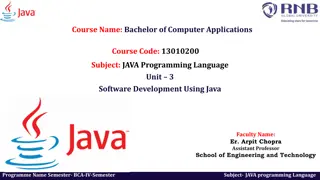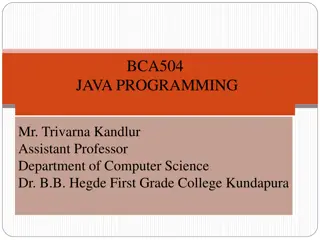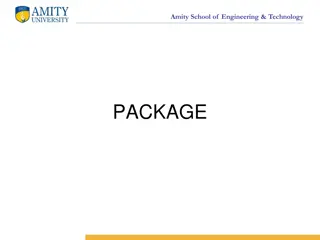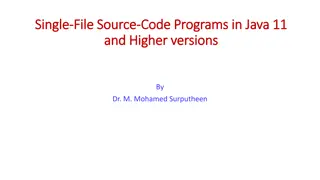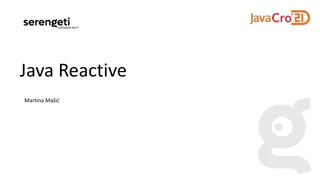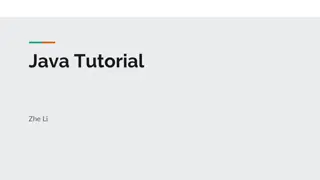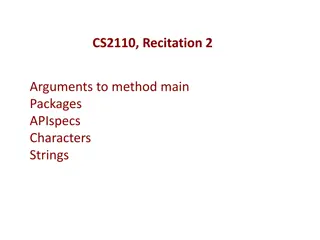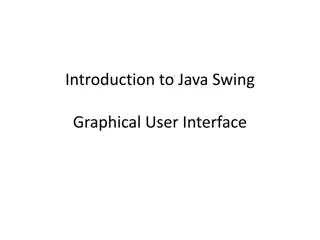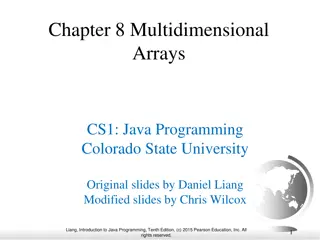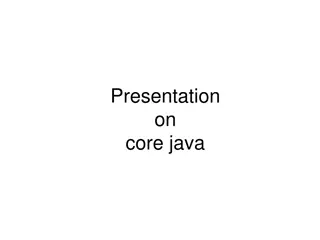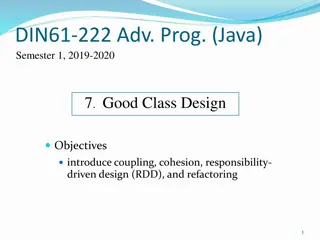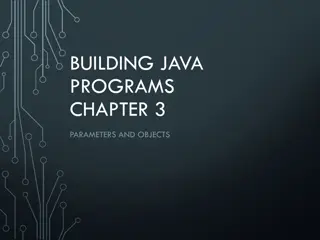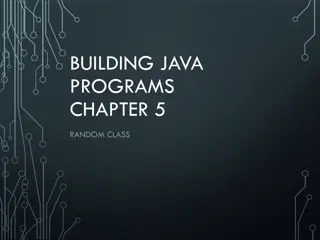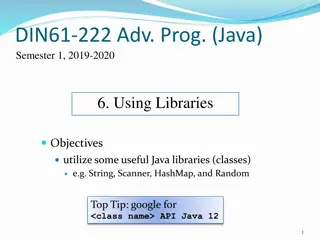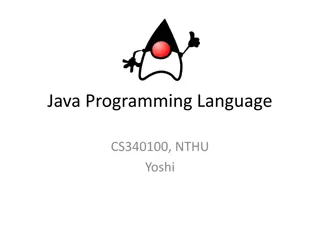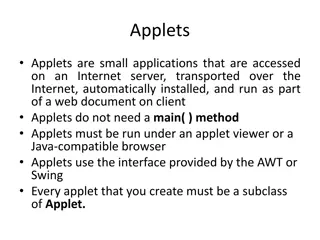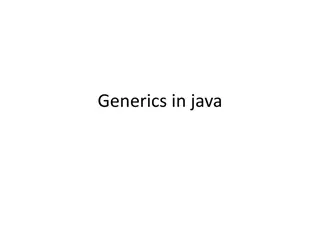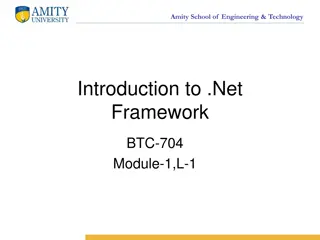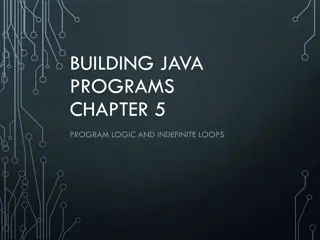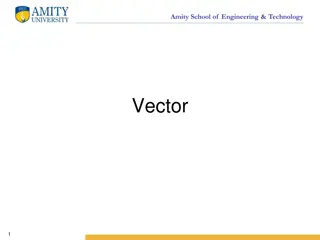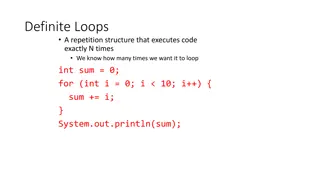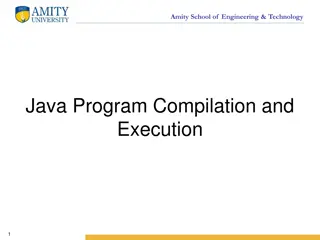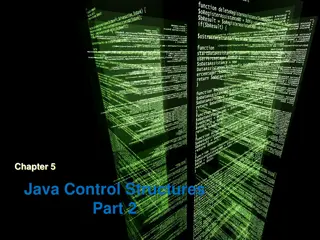Learning the Basics of Java Programming through Visual Guides
Explore the fundamentals of Java programming step by step with visual aids covering syntax, variables, loops, logic operators, iteration, and more. Understand essential concepts such as conditional statements, iteration types, and logic checks in Java.
Download Presentation

Please find below an Image/Link to download the presentation.
The content on the website is provided AS IS for your information and personal use only. It may not be sold, licensed, or shared on other websites without obtaining consent from the author. Download presentation by click this link. If you encounter any issues during the download, it is possible that the publisher has removed the file from their server.
E N D
Presentation Transcript
Java for Beginners University Greenwich Computing At School DASCO Chris Coetzee
What do you learn last time? Wordle.org
Levels of Java coding 1: Syntax, laws, variables, output 2: Input, calculations, String manipulation 3: Selection (IF-ELSE) 4: Iteration/Loops (FOR/WHILE) 5: Complex algorithms 6: Arrays 7: File management 8: Methods 9: Objects and classes 10: Graphical user interface elements
if(condition) Condition is a logic check something OPERATOR something Example: if(num == 3)
Logic operators in Java Operator Function equals (int, double, char, boolean) equals (String) Example == if(num==3) .equals() if(name.equals( Chris ) ) > if(num>20) greater than < if(num<15) less than >= greater than or equal to if(age>=18) <= if(age<=12) less than or equal to != if(married!=true) not equal to Warning! Warning! = = does not mean does not mean == ==
AND/OR AND in Java: && OR in Java: || Used between conditions if(num>3&&<12) if(num>3)&&(num<12)
Types of iteration (loops) Iteration https://encrypted-tbn2.gstatic.com/images?q=tbn:ANd9GcSlpvYdLJ94eyYrNXT5u-L3pl_wuzhIn52cHoQq0YTo28Ik9-CNNQ Fixed number of times Unspecified number of times WHILE loop FOR loop
A logic condition (like in IF) that has to be true for the loop to continue. Something Operator Something (usually involving the counter variable) A simple variable (usually an int) that allows the loop to step through Normally called i for(counter; condition; change) http://freeiconbox.com/icon/256/2774.png What should happen to the counter variable value at the end of the loop Usually i++ or i--
Typical example (FOR loop) At end of for loop, increase i by 1 Create int called i Set i to 0 Continue while i is less than 3 for(int i = 0; i<3; i++) { System.out.println( X ); } X X X Output
Another example (FOR loop) At end of for loop, increase i by 1 Create int called i Set i to 0 Continue while i is less than 5 for(int i = 0; i<5; i++) { System.out.println(i); } 0 1 2 3 4 Output
Predict the outcome (FOR loop) What change happens? What is the counter and starting value? What is the condition? for(int j = 2; j<10; j=j+2) { System.out.println(j); } 2 4 6 8 ? Output
Students struggle with EVERYTHING ABOUT LOOPS Loops are an abstract construct. Lower ability students will need a LOT of simple practice. Most common mistake: for(int i = 0; i<5; i++);
FOR example Can you spot the mistake? Enter your favourite word > Cheese Here is Cheese 3 times! Cheese Cheese Cheese Cheese That s all folks! Output
FOR with .charAt(x) s p e c t r u m? Output
Detour: random numbers It can be very useful to make a random number in program. Java has a many ways to do this. Most common way is Math.random() Note: This is NOT an examinable bit, but it does teach logical thinking which IS examinable.
Making random numbers Math.random() generates a random double number between 0 and 1. e.g. 0.34212 or 0.93813 To make random int numbers between say 1 and 10 (both included), we need to use a bit of maths.
Useful formula: Min+(int)(Math.random()*((Max - Min) + 1)) Write down the minimum number and maximum number you need, and use the formula! So let s make numbers between 1 and 10: 1 +(int)(Math.random()*((10 - 1) + 1))
FOR with random ints (A) 17? 17 17 Output
FOR with random ints (B) 12? 19 7 Output
Example task (advanced) Write a java program that will generate a random letter of the alphabet 5 times. Example output: g u l x e ?
https://encrypted-tbn0.gstatic.com/images?q=tbn:ANd9GcRJ84g8ztifGtt_bgSXsiKizV4uHjj0mnr2FxslBcgmr8PhGSJQdQhttps://encrypted-tbn0.gstatic.com/images?q=tbn:ANd9GcRJ84g8ztifGtt_bgSXsiKizV4uHjj0mnr2FxslBcgmr8PhGSJQdQ



